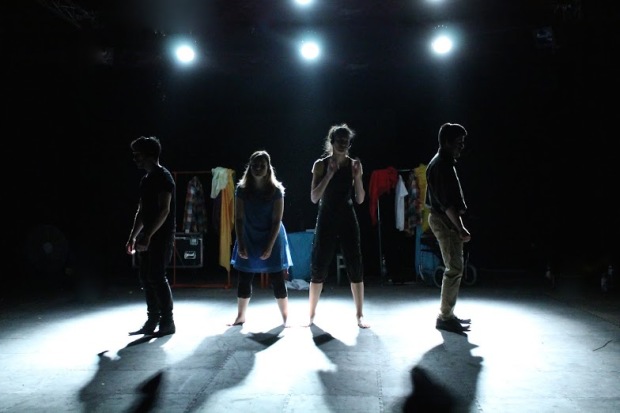You have no items in your cart. Want to get some nice things?
Go shopping
It would be much too cruel, and untrue, to say that there is “nothing to see” in this complex little production, yet Penelope Faith’s dynamic attempt to portray a series of individuals with imaginary friends certainly seems to have something central missing. The individual tales are told well, the acting is good and the best moments are when both stories and actors overlap and engage. However, I want more. When the lights go down at the end, I’m not satisfied. As the cast tell me ardently with their bowing and smiling faces that there is indeed “nothing to see here” any more on the stage before me, I find myself confused, even frustrated. Perhaps that’s the point, I tell myself. They’re questioning the limits of what it is to be seen, to be heard, letting the audience decide for themselves what’s happened, what’s going on, I’ve probably misunderstood it. Yet then again, I can’t help but feel this piece needs further work to reach its full potential, and a clarity to bring its beautiful strands into a sharper, more defined shape.
It’s a sombre bunch of portraits that are presented: Josie (Bryony Thomas), the girl who never got to be a ballerina; Jon (Jared Rogers), the lonely boy who just wants a friend to talk to; Mal (Elyett Burnett), the boy who seems so confident, but might just be the most afraid, and his sister Rose (Kim Burnett) the girl who never got to grow up.
Rose only reaches a state of independence by the end of the play; before this, she is duty-bound to care for her elderly mother and plagued by an imaginary brother, a memory of childhood that she has yet to release and forget. The adolescent Mal who appears – as a memory or as a figment of Rose’s imagination we never find out – is practically demonic, as he jumps around her, slobbering over popcorn and spouting marshmallows – with some impressive marshmallow juggling. Mal himself now grown is a motivational speaker and life coach, who records “breathing’”videos for the likes of the lonely and insecure such as the awkward Jon who is plagued by his own demons.
Both Kim Burnett and Bryony Thomas excel in their dexterity, and their tandem working as the sinister “Martha”, Jon’s attention-seeking imaginary playfellow, works beautifully. In one scene in particular both sit on top of him, lovingly stroking him and giggling as Mal attempts to talk to him. In this physical stifling, we begin to see the emotional weight that Martha truly represents, and the pressure such imaginary friends are able to put on one’s control and connection to reality. Jon almost can’t stand up; he’s weighed down by Martha, by his own insecurities, by the creations of his own mind.
Josie works at a call centre, and when she finally escapes this monotony she plunges herself into one of the more brilliantly surreal scenes of the evening. In this visual delight, she buys a hundred shades of yellow paint and recites their various names with glee as yellow scarfs are draped over her and yellow-tinted sunglasses adorn her eyes, all to the sound of Donovan’s “Mellow Yellow”. Josie is stuck in a dead end job; it’s no wonder her imagination begins to run away with her and produce a world more enthralling than the mundane reality of her everyday.
If the trailer for this production promises a lot more than this performance actually delivers, it’s no fault of the actors, who manage well with the script even at its most tenuous points. The sombre shape of this production is nicely countered with comedic interludes and there are some brilliant moments with excellent direction. One of the most effective scenes sees the cast act out Jon’s attempt to navigate the web: Google becomes a personified being in the capable hands of Bryony Thomas, the Google poems that a search engine question throws up spouted from individual lips.
Indeed, Penelope Faith’s script is good, but simply too narrow. So much could have been explored with these characters and with the concept of the imagination and the unseen. Imaginary friends often suggest internal division. Should you let a child have an imaginary friend? Is it healthy? Is it normal? Yet rather than engaging with these dilemmas, Faith simply serves them up in a series of encounters and moves on quickly to the next. We need time to explore why these people are haunted, but also why their fears manifest themselves with such ferocity in the ways that they do, and these questions are ones that deserve to be answered. Nothing To See Here is a brave production but it needs more development to ensure it doesn’t live up too closely to its name.

About Thea Hawlin
Theodora (Thea) Hawlin is assistant editor and production manager of The London Magazine.




